Teeth
Handedness and Dental Wear
Back in 1950, Dr. Nishijima of Osaka University claimed that dentists could tell whether a person was right or left handed just by looking at their teeth — due to differential wear patterns from brushing.His claim sounds logical enough to me, but more recent research doesn't seem to support it. According to a Dec 2010 article in the Journal of Dental Sciences: "no statistically significant relationship was found between hand preference and tooth-brushing abrasion in this study."

Melbourne Sun News-Pictorial - Jan 21, 1950
Posted By: Alex - Sat Dec 28, 2024 -
Comments (1)
Category: Teeth
Tooth Cap
The Southwark Heritage art museum has a nineteenth-century tooth cap in its collection. It offers this description:
If the cap looks like something you'd like to own, the website toothantique.com claims to be selling them. Newly made tooth caps, not nineteenth-century originals. They're asking only $100. For that price they say you get a cap "Decorated With 40 Real Human Teeth, Drilled And Attached With Twine."
Are they really selling these caps? I'm somewhat doubtful. The picture of their product is the same picture that's on the Southwark Heritage site. But I'm not curious enough to spend $100 to find out what would arrive in the mail.
Posted By: Alex - Fri May 31, 2024 -
Comments (1)
Category: Headgear, Nineteenth Century, Teeth
A toothbrush designed to be bitten
Invented by Anthony John Heath and granted British patent GB 2167995A.

Posted By: Alex - Wed May 22, 2024 -
Comments (0)
Category: Patents, Teeth
Miracle Dentistry
No need for dentists. Just pray away your tooth troubles!
Lloyd Bovee lived for over 50 more years. No mention of tooth problems in his obituary.
Posted By: Alex - Fri Apr 28, 2023 -
Comments (1)
Category: Religion, 1920s, Teeth
Waterloo Teeth
Text from the British Dental Association:Replacement teeth were traditionally made from ivory (hippopotamus, walrus or elephant).
However such teeth did not always look natural and deteriorated more quickly than real teeth. If you wanted a really nice set of dentures these were made with an ivory base and then set with real human teeth.
These were expensive as it could take six weeks to make a complete set. They have subsequently become known as 'Waterloo teeth', as some were scavenged from dead soldiers on battlefields.

Posted By: Alex - Fri Dec 16, 2022 -
Comments (0)
Category: War, Teeth
How much do you need to chew your food?
British dentist John H. Farrell spent much of his career studying the relationship between chewing and digestion. This involved repeated experiments in which he put bits of food in small, cotton-mesh bags, had subjects chew the food (or not), and then swallow it. The next step was more unpleasant:The years he spent doing this convinced him that "very little chewing is required for maximum digestion."
More info: "The effect on digestibility of methods commonly used to increase the tenderness of lean meat"
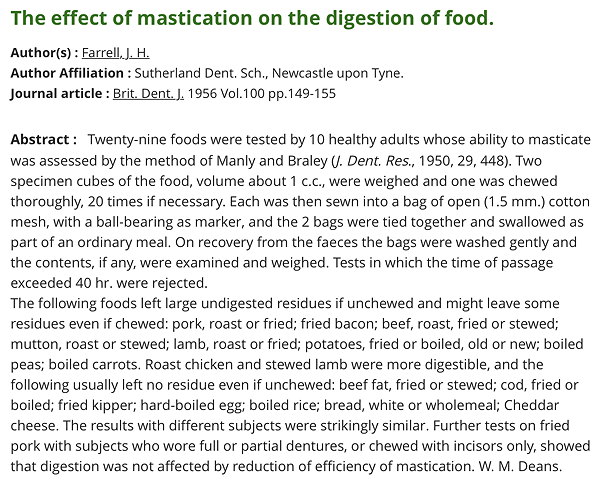
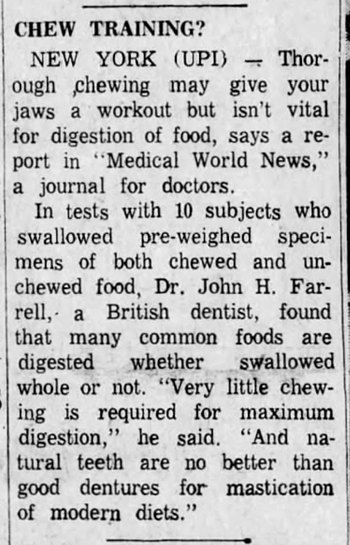
Bedford Times-Mail - Apr 17, 1964
Posted By: Alex - Mon Nov 21, 2022 -
Comments (3)
Category: Food, Experiments, Stomach, Teeth
No makeup or men for five years
When British dentist Philip Grundy died in 1974, he left the bulk of his estate, slightly over $400,000, to Amelia Whaite, the receptionist at his practice. But with some unusual conditions. He forbid her from wearing lipstick or makeup, or going out with any men, for five years.$400,000 in 1974, adjusted for inflation, would be over $2,000,000 today. So a nice chunk of money.
However, Grunday also made Whaite the sole executor of his estate "with the responsibility to see the will's conditions are kept." So if she didn't follow the conditions was she supposed to self-report herself?
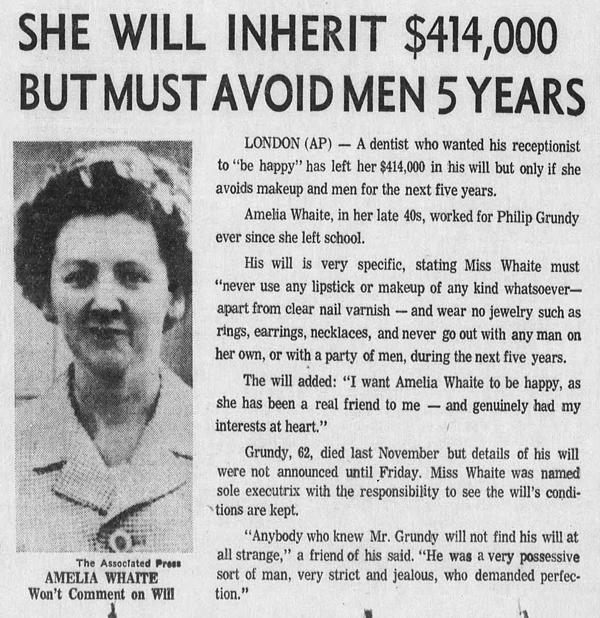
Atlanta Constitution - Mar 17, 1974
I found a forum where residents of Leyland, Lancashire (where Grundy worked) recalled going to his practice. Seems that, in addition to the money, he left behind a lot of traumatized patients. Some typical comments:
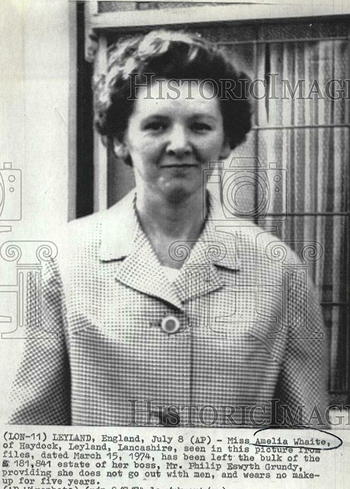
Some more info about Grundy and Whaite from a 1974 Associated Press article:
Four years later, Grundy was accused of addiction to inhaling anesthetic gas and was forbidden to practice for five years.
He resumed his practice in 1971 and built it into a flourishing enterprise with a staff of 14. . .
Miss Whaite now runs the practice, still with a 14-member staff.
Grundy sounds like he was a real piece of work.
Posted By: Alex - Wed Aug 31, 2022 -
Comments (5)
Category: Law, 1970s, Teeth
Triple-Bristle Toothbrush
Posted By: Paul - Tue Jun 07, 2022 -
Comments (0)
Category: Excess, Overkill, Hyperbole and Too Much Is Not Enough, Hygiene, Inventions, Chindogu, Teeth
Theora Carter, Apostle of the Toothbrush
Read more about the lady here.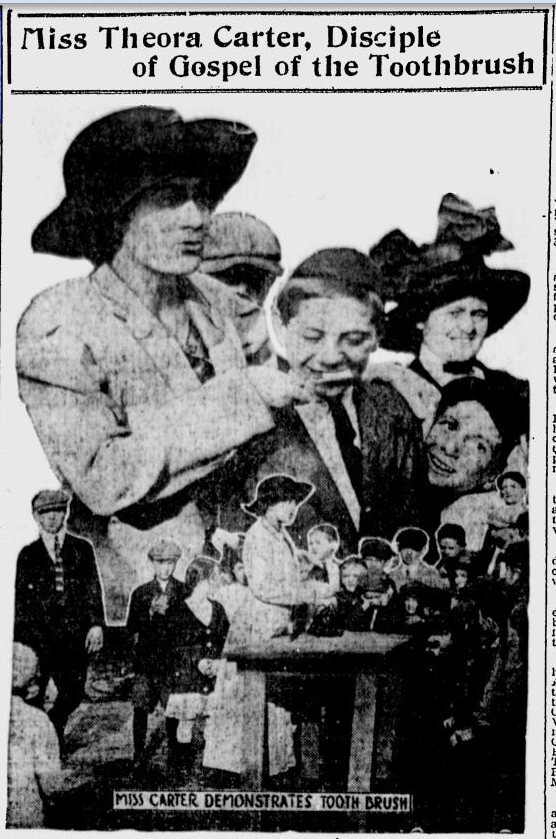

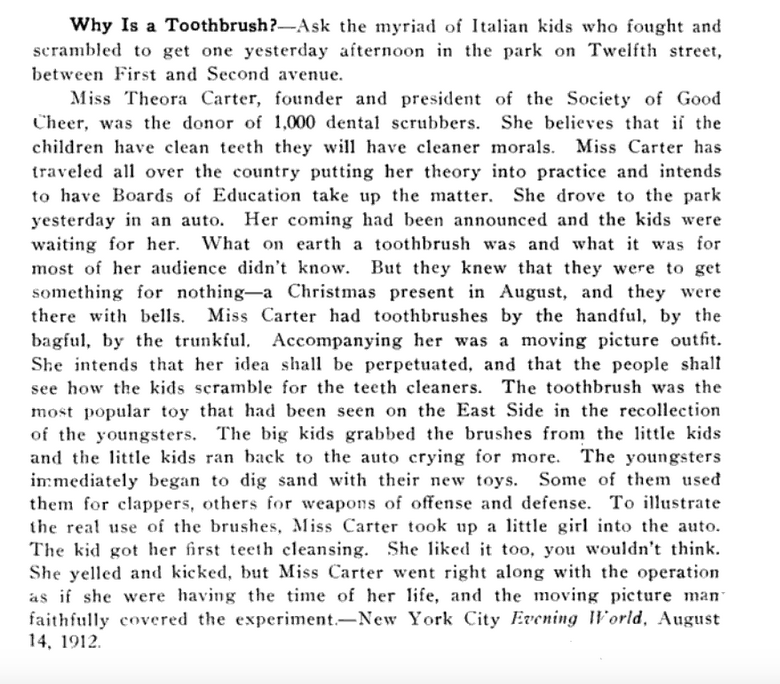
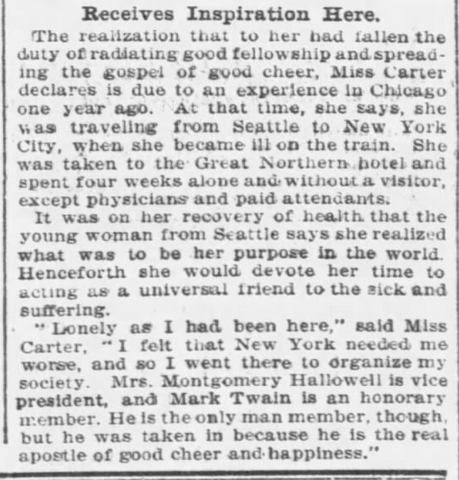
Posted By: Paul - Sat May 07, 2022 -
Comments (0)
Category: Clubs, Fraternities and Other Self-selecting Organizations, Hygiene, 1910s, Teeth
Wolfe v. Feldman
Peter Ackerberg, writing in the Minneapolis Star (Nov 17, 1979), described the unusual legal case of Wolfe v. Feldman, which was heard in 1936:Feldman countered that it wasn't his fault, and he told the judge this story:
Wolfe was strapped to the dentist's chair (apparently a common procedure then), and was given nitrous oxide, an anesthesia better known as laughing gas. What happened next was no laughing matter.
The next part of the story is best summarized in the text of the case itself:
So the patient, while under the influence of laughing gas, managed to grab hold of the dentist's testicles, and in the process of freeing himself the dentist fractured her little finger.
Nevertheless, the judge ruled in favor of the patient for $650, saying:
Posted By: Alex - Tue Apr 26, 2022 -
Comments (0)
Category: Lawsuits, 1930s, Teeth

| Who We Are |
|---|
| Alex Boese Alex is the creator and curator of the Museum of Hoaxes. He's also the author of various weird, non-fiction, science-themed books such as Elephants on Acid and Psychedelic Apes. Paul Di Filippo Paul has been paid to put weird ideas into fictional form for over thirty years, in his career as a noted science fiction writer. He has recently begun blogging on many curious topics with three fellow writers at The Inferior 4+1. Contact Us |




